CS50's Introduction to Game Development
Learn about the development of 2D and 3D interactive games in this hands-on course, as you explore the design of games such as Super Mario Bros., Pokmon, Angry Birds, and more.
Created by: David J. Malan
Produced in 2018
 What you will learn
What you will learn
- Principles of 2D and 3D graphics.
- Animation.
- Sound.
- Collision detection.
- Frameworks including Unity and LOVE 2D.
- Lua and C#.
 Quality Score
Quality Score
Content Quality
/
Video Quality
/
Qualified Instructor
/
Course Pace
/
Course Depth & Coverage
/
Overall Score : 94 / 100
 Live Chat with CourseDuck's Co-Founder for Help
Live Chat with CourseDuck's Co-Founder for Help
Need help deciding on a game design course? Or looking for more detail on David J. Malan's CS50's Introduction to Game Development? Feel free to chat below.
Join CourseDuck's Online Learning Discord Community
 Course Description
Course Description
 game design Awards Best Free Course
game design Awards Best Free Course
In a quest to understand how video games themselves are implemented, you'll explore the design of such childhood games as:
Super Mario Bros. Pong
Flappy Bird
Breakout
Match 3
Legend of Zelda
Angry Birds
Pokmon
3D Helicopter Game
Dreadhalls
Portal
Super Mario Bros. Pong
Flappy Bird
Breakout
Match 3
Legend of Zelda
Angry Birds
Pokmon
3D Helicopter Game
Dreadhalls
Portal
 Pros
Pros
 Cons
Cons
-
- Course is the 2nd in a series. For a more complete learning experience, the entire series can be studied for free.
- Project-focused learning ensures that anyone who completes the course will have made their first video game.
- Course can be taken for college credit through Harvard University.
-
- Professional certificate costs $150.
- Course is designed at an intermediate level. Beginners cannot start here.
- Course is only free if you do not want college credit.
 Instructor Details
Instructor Details

- 4.7 Rating
 3 Reviews
3 Reviews
David J. Malan
David is Gordon McKay Professor of the Practice of Computer Science in the School of Engineering and Applied Sciences and a Member of the Faculty of Education in the Graduate School of Education at Harvard University. He received his A.B., S.M., and Ph.D. in Computer Science from Harvard in 1999, 2004, and 2007, respectively.





